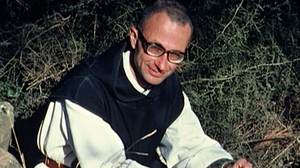A few days ago I recommended seeing “Of Gods and Men.” Last week I saw the film and I have still been thinking of the movie, the monks, the hard work of inter-religious dialog. The testament of Dom Christian de Cherge can be read here. I highly recommend reading what Prior Christian said and what others think. A group of friends took time to see the movie together. Two friends brought a perspective of the film to my attention recently. The following is an an answer to those who ask whether a desire for God is still present in our times. Angelo Scola writes:
I believe that the worldwide success of the film on the Tibhirine
monks [U.S. Title: “Of Gods and Men”] reflects a burning desire in the men and
women of any latitude to meet the face of God; it therefore reflects the real
need we all feel for authentic witnesses who may help us keep our gazes focused
upwards.
Authentic witness is, in fact, not limited to “giving a good example”.
It shines in all its wholeness as a method for practically knowing reality and
communicating truth. It is a primary value, standing above any other form of
knowledge and communication – scientific, philosophical, theological, artistic,
etc.
A luminous example of this method is offered by the very words which Fr
Christian de Chergé, prior of the Trappist monastery of Notre-Dame de l’Atlas
in Tibhirine, Algeria, wrote in his spiritual will [noted above], a good three years before
he was massacred with his monks:
“When the time comes, I would like to be able
to have an instant of lucidity that would allow me to ask for the pardon of God
and that of men, my brothers, while forgiving with all my heart those who may
have hit me… I cannot see how I could, in fact, rejoice in that this people I
love could be accused of my assassination. It
would amount to paying too high a price for what might be called “the grace of martyrdom”, to owe it to an Algerian, whoever this might be, especially if he should claim to have acted in faithfulness to what he believes Islam is […] after all, I would have been liberated from the most piercing curiosity I carry inside me: to plunge my gaze into that of the Father in order to see His Islamic children the way He sees them: all lit by the glory of Christ, they too as the fruit of His Passion, invested with the gift of the Spirit, whose secret joy will be that of re-establishing communion and similarity by playing with differences. For this lost life of mine, totally mine and totally theirs, I thank God who seems to have wanted it whole just for this joy, contrary to all and despite all. And you too, my last-moment friend, who will not know what you would be doing, also for you I want to say my thanks, this à-Dieu [literally: “until we meet in God”], as I contemplate you in God’s face. That it may be given us to meet again, two thieves overwhelmed with joy, in Heaven, if that may please God, our Father, Father of us both”.
What is one of the most beautiful pages ever written in the twentieth century gives us a full grasp of how Christian martyrdom contains the fulfilled expression of God’s account of Himself, the one He allows us to give about Him and in His name. Martyrdom, a grace that God concedes to the helpless and that no one can demand, is an insuperable act of unity and mercy. It is the defeat of any eclipse of God, it is His return in fullness through His children’s offer of their lives. This self-surrender defeats evil, even the so-called “unjustifiable” evil, because it restores unity even with its perpetrator.
Just as Jesus takes our evil on Himself by forgiving us beforehand, so the martyr, like Fr Christian, embraces his murderer beforehand in the name of God’s own gift of love, recognized by everyone as at least absolute and transcendent. Only a witness that is worthy of faith can move the other’s freedom and sternly invite him or her to make a decision. As Benedict XVI has effectively remembered, we become witnesses only when “through our actions, words and way of being, an Other appears and communicates His own Self”. The Thibirine monks provoke and move us because in their witness “God is exposed, so to speak, to the risk of man’s freedom”.
Cardinal Angelo Scola is the Patriarch of Venice, Italy.
